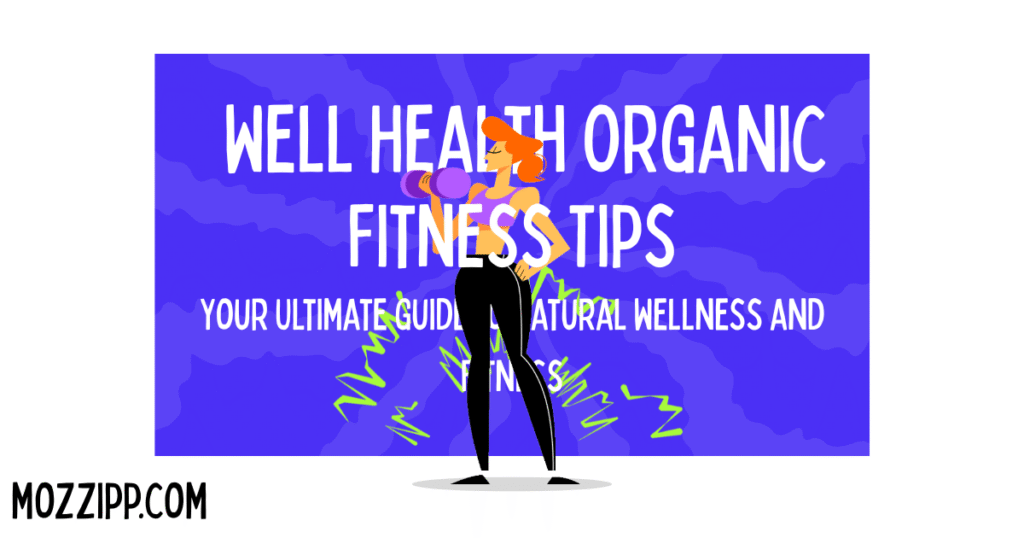In today’s fast-paced world, many people are turning to a more natural, holistic approach to health and fitness. The keyword well health organic fitness tips captures a growing interest in combining organic living with effective fitness strategies to achieve overall wellness. Whether you are a beginner looking to start a healthier lifestyle or someone seeking to deepen your knowledge of organic fitness practices, this comprehensive guide will provide you with actionable insights, bust common myths, and help you embrace a balanced, sustainable approach to health.
Why Choose Well Health Organic Fitness Tips?
The modern fitness landscape is crowded with quick fixes, fad diets, and synthetic supplements. However, a growing number of individuals are opting for organic fitness tips that emphasize natural foods, clean living, and mindful exercise routines. This approach not only supports physical health but also promotes mental clarity and environmental sustainability.
This article will explore:
- The benefits of organic foods and fitness practices
- Practical organic fitness tips for beginners and enthusiasts
- Common misconceptions about organic health and fitness
- How to integrate organic principles into your daily fitness routine
- Real-world examples and expert advice
By the end, you’ll be equipped with the knowledge to make informed decisions that enhance your well-being organically and effectively.
Understanding Well Health Organic Fitness Tips
What Does “Well Health Organic Fitness” Mean?
Well health organic fitness tips refer to strategies and practices that combine organic nutrition with fitness routines designed to improve overall health naturally. This includes consuming organic foods free from synthetic pesticides and chemicals, engaging in physical activities that nurture the body, and adopting lifestyle habits that support long-term wellness.
Why Organic?
Research shows that consuming organic foods can reduce exposure to harmful pesticides and chemicals, which may contribute to obesity, insulin resistance, and other health issues12. Organic foods often contain higher levels of antioxidants, vitamins, and minerals that support body functions and recovery from exercise12. Moreover, organic farming practices promote environmental sustainability, which aligns with a holistic view of health.
The Benefits of Organic Nutrition in Fitness
1. Enhanced Nutrient Intake
Organic fruits and vegetables tend to have more fiber, antioxidants, and micronutrients compared to conventionally grown produce12. These nutrients are essential for muscle repair, energy production, and immune function, making them vital for anyone engaged in fitness.
2. Reduced Chemical Exposure
Pesticides and synthetic fertilizers used in conventional farming can disrupt hormone balance and increase fat storage12. Choosing organic reduces your intake of these substances, potentially lowering your risk of obesity and metabolic disorders.
3. Better Weight Management
Studies indicate that organic food consumption is associated with an 11% reduced probability of obesity12. This may be due to the higher nutrient density and lower sugar content in organic foods.
4. Improved Taste and Satisfaction
Organic foods often have richer flavors because they are grown in healthier soil and harvested at peak ripeness13. This can enhance meal satisfaction and reduce cravings for unhealthy snacks.
Practical Organic Fitness Tips for a Healthy Lifestyle
Nutrition Tips
- Choose whole, minimally processed organic foods: Opt for organic fruits, vegetables, whole grains, nuts, and lean proteins. Avoid processed organic snacks that may still be high in sugar or unhealthy fats.
- Incorporate organic superfoods: Foods like organic chia seeds, quinoa, and turmeric can boost energy and reduce inflammation.
- Stay hydrated with pure water: Use filtered or spring water to avoid contaminants.
- Plan balanced meals: Combine organic carbs, proteins, and healthy fats for sustained energy during workouts.
Fitness Tips
- Exercise outdoors: Engage in activities like hiking, jogging, or yoga in natural settings to connect with nature and reduce stress.
- Practice mindful movement: Incorporate stretching, Pilates, or tai chi to improve flexibility and mental focus.
- Use organic fitness gear: Choose eco-friendly workout clothes made from organic cotton or bamboo to reduce chemical exposure.
- Listen to your body: Avoid overtraining and prioritize rest to allow natural recovery.
Lifestyle Tips
- Prioritize sleep: Quality sleep supports muscle repair and hormone balance.
- Manage stress naturally: Use meditation, deep breathing, or aromatherapy with organic essential oils.
- Limit exposure to toxins: Choose organic personal care products and clean your environment with natural cleaners.
Busting Common Myths About Organic Fitness and Health
| Myth | Reality |
|---|---|
| Organic foods are just a marketing gimmick | Organic certification involves strict standards that prohibit synthetic chemicals and GMOs. |
| Organic foods are always expensive | While sometimes pricier, organic farming supports sustainability and health, offering long-term benefits. |
| Organic means healthier in all cases | Not all organic foods are healthy; processed organic snacks can still be high in sugar and fat. |
| Organic foods spoil faster | Some organic foods have shorter shelf lives, but products like organic ghee and oils last long due to natural preservatives. |
| Organic is the same as natural | “Natural” is unregulated; “organic” is a certified standard ensuring no synthetic inputs. |
Real-World Example: Incorporating Organic Fitness Tips
Consider Sarah, a 30-year-old office worker who struggled with low energy and weight gain. She decided to shift to an organic lifestyle by:
- Switching to organic fruits, vegetables, and whole grains
- Practicing yoga and walking daily in her local park
- Using organic skincare and fitness apparel
- Drinking herbal teas and reducing caffeine intake
Within three months, Sarah noticed improved energy, better sleep, and gradual weight loss. Her commitment to well health organic fitness tips helped her build sustainable habits without feeling deprived or overwhelmed.
Step-by-Step Guide to Starting Your Organic Fitness Journey
- Assess your current diet and fitness routine.
- Start by replacing one or two conventional foods with organic alternatives weekly.
- Incorporate at least 30 minutes of moderate exercise daily, preferably outdoors.
- Switch to organic personal care and fitness gear gradually.
- Practice mindfulness techniques to support mental health.
- Track your progress and adjust based on how you feel physically and mentally.
Conclusion
Adopting well health organic fitness tips is more than a trend-it’s a lifestyle choice that nurtures your body, mind, and environment. By focusing on organic nutrition, mindful exercise, and sustainable habits, you can achieve a balanced, healthy life that feels natural and rewarding.
Are you ready to make the switch to organic fitness? Share your thoughts or questions below-we’d love to hear your journey!
FAQs
Q: What are the key benefits of organic foods for fitness enthusiasts?
Ans: Organic foods provide higher nutrient density, reduce exposure to harmful chemicals, and support better weight management, all of which enhance fitness outcomes.
Q: Can I still eat processed foods if they are organic?
Ans: Yes, but it’s best to limit processed organic foods as they can still contain high sugar, salt, or unhealthy fats. Focus on whole, minimally processed organic foods for optimal health.
Q: How do organic fitness tips differ from conventional advice?
Ans: Organic fitness tips emphasize natural, chemical-free nutrition and eco-friendly lifestyle practices alongside physical activity, promoting holistic wellness.
Q: Is organic fitness more expensive?
Ans: Organic products can be pricier due to sustainable farming practices, but investing in organic health can reduce medical costs and improve quality of life over time.
Q: How can beginners start incorporating organic fitness tips?
Ans: Start small by choosing organic produce, exercising outdoors, and gradually replacing synthetic products with organic alternatives, focusing on consistency rather than perfection.
Q: Are organic foods more effective for weight loss?
Ans: Studies suggest organic food consumption is linked to a lower risk of obesity, possibly due to better nutrient profiles and lower chemical exposure.
Q: What are some common misconceptions about organic fitness?
Ans: Common myths include organic being just a marketing gimmick, always expensive, or synonymous with “natural.” Understanding certification and product quality is key.
Read More: Ontario Measles Travel Advisory | MyFastbroker com | Unlocking the Power of 5StarsStocks.com Materials


